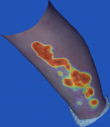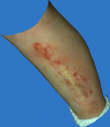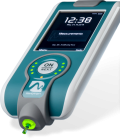Featured CDSI Research of Dr. Eric Tkaczyk
Dr. Eric Tkaczyk develops artificial intelligence algorithms, imaging, and other technologies to provide skin-based assessments for personalized, evidence-based decisions within dermatology as well as in applications to systemic diseases with skin manifestations, such as Stevens-Johnson syndrome/toxic epidermal necrolysis researched at CDSI.

Eric Tkaczyk, MD, PhD, FAAD, is an Associate Professor of Dermatology at Vanderbilt University Medical Center and Director of the Vanderbilt Dermatology Translational Research Clinic.
Expertise:
Dr. Tkaczyk is a physician-scientist with expertise in studying biophotonics for the diagnosis and treatment of cutaneous diseases. For example, Dr. Tkaczyk utilizes noninvasive diagnostic technology, 3D Imaging, and machine learning/artificial intelligence to research cutaneous diseases both at the Center for Drug Safety and Immunology (CDSI) and at the Vanderbilt Dermatology Translational Research Clinic (VDTRC).
Current Focus:
As part of the North American Therapeutics In Epidermal Necrolysis Syndrome (NATIENS) study, Dr. Tkaczyk, Dr. Elizabeth Phillips, and research staff utilize 3D photography analyzed with novel informatic approaches to assess Stevens-Johnson syndrome/toxic epidermal necrolysis (SJS/TEN) disease evolution and resolution.
As the founding director of the VDTRC, Dr. Tkaczyk works with a multidisciplinary team of clinicians and engineers whose mission is to seamlessly integrate patient care, clinical investigation, and fundamental technology research with applications in dermatology, oncology, hematology, and other specialties.
Learn more about Dr. Tkaczyk's research projects below.




